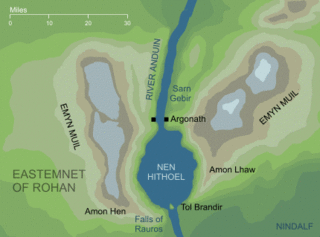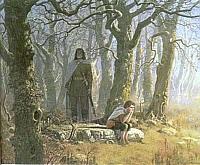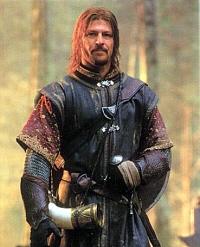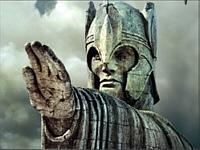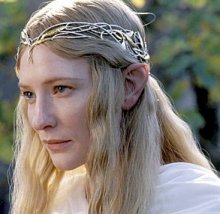TTT: Bk 3, Ch 5
"We meet again. At the turn of the tide."While Merry and Pippin are talking with Quickbeam on the second day of the Entmoot, Aragorn, Legolas and Gimli survey the battleground left by the Men of Rohan and the Orcs. It is daybreak and the three hunters continue to search for signs of their little friends. They are wary of their encounter the night before and keep an eye out for Saruman. Aragorn finds a Lorien leaf that once held some lembas bread. The trail has grown warm again. Using his tracking skills, Aragorn uses additional
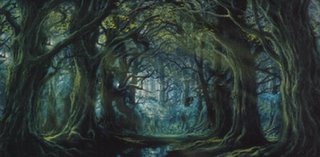 evidence - an Orc dagger, cut-up cord and small footprints - to guess the fate of the hobbits. Through some strange circumstance they were able to escape their captors, after which need drove them into Fangorn. Despite their trepidation, they follow the trail into the forest. Legolas senses that it is old and full of memory. As a Wood-Elf, he appreciates its dark beauty though Gimli feels no desire to tarry.
evidence - an Orc dagger, cut-up cord and small footprints - to guess the fate of the hobbits. Through some strange circumstance they were able to escape their captors, after which need drove them into Fangorn. Despite their trepidation, they follow the trail into the forest. Legolas senses that it is old and full of memory. As a Wood-Elf, he appreciates its dark beauty though Gimli feels no desire to tarry.Eventually they find themselves at the very shelf where Merry and Pippin met Treebeard. In the distance they see an old man walking among the trees. His head was bowed and he is dressed in rags. They wait as the old man ascends the hill, anticipating some evil magic of Saruman. The old man speaks: "Well met indeed, my friends." Aragorn asks his name. The old man replies, "Have you not guessed it already? You have heard it before, I think." At that moment, he draws away his grey cloak. They see that underneath he is clothed all in white and it shines upon them. "Mithrandir!" cries Legolas, "Mithrandir!" It is Gandalf!
"They all gazed at him. His hair was white as snow in the sunshine; and gleaming white was his robe; the eyes under his deep brows were bright, piercing as the rays of the sun; power was in his hand. Between wonder, joy, and fear they stood and found no words to say."
They cannot believe their eyes. It is there old friend, lost in Moria but now returned. In casting aside the weapons of the three hunters, the wizard reveals a greater power than that which was wielded by the Grey Pilgrim. Bewildered, Gimli asks him why he is now dressed in white. He says, "Indeed I am Saruman, one might almost say, Saruman as he should have been." The four of them spend some time bringing themselves up to speed on their adventure. Gimli asks if it was Gandalf that they had seen the night before. It was in fact Saruman that they had seen, venturing east to discover what had become of his Orcs and the hobbits. But he was too late, for the Orcs were destroyed and the hobbits had escaped into Fangorn. However, the fate of the Ring eluded Saruman. If fact, it was because of his fear that it might fall into the hands of Theoden, King of Rohan, that he unleashed his Orc army to assail the forces of that land. Gandalf knows that Merry and Pippin are with Treebeard and the Ents and he knows that they have been roused to anger against Saruman. And of course when the Ents arrive, Saruman will be left undefended. Their path does not lie toward Isengard. He tells them they must now journey to Edoras in Rohan to aid King Theoden. But first, Legolas wants to know what happened to Gandalf since his descent into the abyss in Moria.
Bewildered, Gimli asks him why he is now dressed in white. He says, "Indeed I am Saruman, one might almost say, Saruman as he should have been." The four of them spend some time bringing themselves up to speed on their adventure. Gimli asks if it was Gandalf that they had seen the night before. It was in fact Saruman that they had seen, venturing east to discover what had become of his Orcs and the hobbits. But he was too late, for the Orcs were destroyed and the hobbits had escaped into Fangorn. However, the fate of the Ring eluded Saruman. If fact, it was because of his fear that it might fall into the hands of Theoden, King of Rohan, that he unleashed his Orc army to assail the forces of that land. Gandalf knows that Merry and Pippin are with Treebeard and the Ents and he knows that they have been roused to anger against Saruman. And of course when the Ents arrive, Saruman will be left undefended. Their path does not lie toward Isengard. He tells them they must now journey to Edoras in Rohan to aid King Theoden. But first, Legolas wants to know what happened to Gandalf since his descent into the abyss in Moria.
Gandalf did reach the bottom of the chasm - "the uttermost foundations of stone" - with the Balrog. They continued to fight for many days under the mountain until they came to the endless stair, built by Durin's folk in the Second Age. It led all the way to the peak of the Silvertine, the mountain immediately to the south of Caradhras. There, exposed to the harsh snows of the mountain top, was Durin's tower.
Gandalf was finally able to destroy the Balrog, sending it crashing down into the side of the mountain. At that point, Gandalf's body was broken and his spirit journeyed, straying "out of thought and time" to the Undying Lands in a way that defied time and space. But he was sent back in a new body: "Naked I was sent back - for a brief time. Until my task is done." Gwaihir, the Lord of the Eagles had been sent by Galadriel to search for Gandalf. For she new his true nature and hoped that he would somehow survive. The eagle bore him back to Lothlorien where he was clad in his current raiments and crafted a new staff from the wood of the Mallorn tree. Interestingly enough, Gandalf managed to retain possession of his sword, Glamdring. Tolkien never comments on this remarkable feat in any of his writings. Again, Gwaihir carried him south to search for the Fellowship and was able to catch up with his friends at Fangorn.
mountain. At that point, Gandalf's body was broken and his spirit journeyed, straying "out of thought and time" to the Undying Lands in a way that defied time and space. But he was sent back in a new body: "Naked I was sent back - for a brief time. Until my task is done." Gwaihir, the Lord of the Eagles had been sent by Galadriel to search for Gandalf. For she new his true nature and hoped that he would somehow survive. The eagle bore him back to Lothlorien where he was clad in his current raiments and crafted a new staff from the wood of the Mallorn tree. Interestingly enough, Gandalf managed to retain possession of his sword, Glamdring. Tolkien never comments on this remarkable feat in any of his writings. Again, Gwaihir carried him south to search for the Fellowship and was able to catch up with his friends at Fangorn.
At this point, I think it would be appropriate to shed some light on Gandalf's "true nature" as well as give some background on the wizards. Who were they? Where did they come from? And how was Gandalf able to return after death? Most of the answers can be found in Unfinished Tales of Numenor and Middle-Earth.
Gandalf and the other wizards, also known as the Istari, were all Maiar spirits but of varying rank and status. They were sent by the Valar, possibly at the instruction Eru Iluvatar, to Middle-Earth to assist Men and Elves in their struggle with Sauron, whose power was growing again in the Third Age. The story, they way Tolkien conceived it, is that some of the Valar asked for volunteers among the Maiar to accept this task. The first was Curumo. He was chosen by Aule to make the journey. Curumo would become Saruman the White and was appointed the leader of the Istari. With him, he took Aiwendel - who would become Radagast the Brown - at the request of Aule's female counterpart, Yavanna. The Vala Orome chose Alatar, who took with him Pallando. These two were known as "the blue wizards". Lastly, Manwe chose Olorin. For though Olorin was not considered to be as wise and powerful as Curumo, Manwe recognized in him the qualities of humility and compassion.
There may have been more, but Tolkien only addresses these five Istari directly. These "emissaries" took the form of men "already old in years but hale in body, travelers and wanderers, gaining knowledge of Middle-Earth and all that dwelt herein, but revealing to none their powers and purposes." Though they were not subject to dying natural physical deaths, they experienced fear, pain and weariness as well as hunger and thirst as a mortal would. And their physical incarnations could be slain.
They went to Middle-Earth by ship to the Grey Havens at the Gulf of Lune, at approximately the year 1000 of the Third Age. Cirdan the Shipwright was one of the few who knew of their origins, having seen them all arrive. Gandalf was the last of the five to reach the Havens and Cirdan, who was the bearer of Narya the Elven ring of fire, felt that the grey wizard was actually the greatest of the Istari and gave to him that ring. He told Gandalf that it would aid him in the "great labours and perils" that lay before him. Eventually, Saruman would learn of this gift and it led to a secret animosity and ill-will in him towards Gandalf.
Gandalf, as it turned out, was the only one of the Istari who remained faithful to his mission. Radagast had become so enamored of the birds and beasts of Middle-Earth that he forsook Elves and Men. Saruman grew proud and desired power, and so became ensnared by Sauron. Not much is know of the fates of the blue wizards, Alatar and Pallando, for they traveled far into the eastern lands of Middle-Earth and never returned. Not only did Gandalf adhere to the "rules" given to him by the Valar, but he fully passed the tests on a moral plane as well. By his sacrifice at the bridge of Khazad-Dum, he had given up any hope of personal success in the conflict with Sauron and saved the remaining members of the Fellowship.
Because of this, Gandalf earned the blessing of Eru. In an uncharacteristic intervention, he sent Olorin back to Middle-Earth as G andalf the White. Or seen in another way, Gandalf: Reloaded. He is given the mantle of leadership that Saruman had ceded. His task was not yet finished and he was given greater power, though he was still prohibited from using his power to take on Sauron directly. The overthrow of Sauron had to come as a result of the choices made and actions taken by Men. Rather, Gandalf's role was to rally and unite the free peoples to oppose the Dark Lord - all the while knowing that the true hope of the word rested on the shoulders of a hobbit, who even now was approaching Mordor through the Dead Marshes. Though exactly what fate lie ahead for Frodo and Sam, Gandalf could not be sure.
andalf the White. Or seen in another way, Gandalf: Reloaded. He is given the mantle of leadership that Saruman had ceded. His task was not yet finished and he was given greater power, though he was still prohibited from using his power to take on Sauron directly. The overthrow of Sauron had to come as a result of the choices made and actions taken by Men. Rather, Gandalf's role was to rally and unite the free peoples to oppose the Dark Lord - all the while knowing that the true hope of the word rested on the shoulders of a hobbit, who even now was approaching Mordor through the Dead Marshes. Though exactly what fate lie ahead for Frodo and Sam, Gandalf could not be sure.
Now the task at hand was to journey at great speed to Edoras. Gandalf's steed, Shadowfax, that bore him first from Rohan to Rivendell now accompanied him. Shadowfax was one of the Mearas, Lords of Horses. The Mearas were descended from those brought to Middle-Earth by the Valar during the Elder Days. Shadowfax's presence was what called Hasufel and Arod away from their camp and they were now with him. The four friends then headed south and as they passed by the Gap of Rohan, they saw a great smoke rising from the direction of Isengard. Legolas asked what it may be. "Battle and war!", said Gandalf, "Ride on!"
------
[Chronology: March 1st - March 2nd 3019 T.A.]
------
Next: The King Of The Golden Hall
(revised 9/17/06)
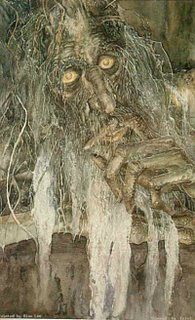
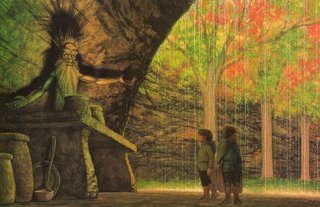
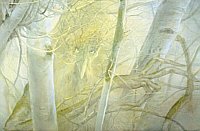

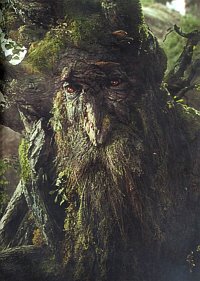


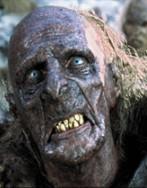


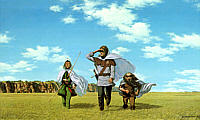
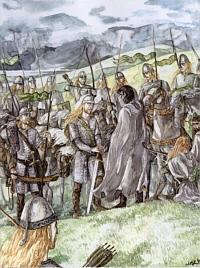
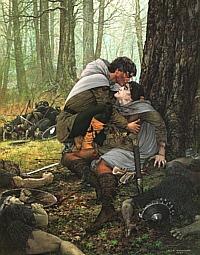

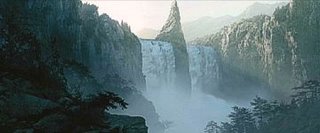 Now Aragorn is faced with a grave decision; should he go east to follow Frodo or west to help Merry and Pippin? His heart tells him that Frodo's fate is no longer in his hands. He is also unwilling to abandon the hobbits to torment and death. He tells Legolas and Gimli that they must travel light and move swiftly west. Of course, his instructions do not include the corny line from PJ's film "let's hunt some Orc". Fortunately, the trail of the Orcs is not hard to follow as they delight in destroying the land that they pass through.
Now Aragorn is faced with a grave decision; should he go east to follow Frodo or west to help Merry and Pippin? His heart tells him that Frodo's fate is no longer in his hands. He is also unwilling to abandon the hobbits to torment and death. He tells Legolas and Gimli that they must travel light and move swiftly west. Of course, his instructions do not include the corny line from PJ's film "let's hunt some Orc". Fortunately, the trail of the Orcs is not hard to follow as they delight in destroying the land that they pass through.
